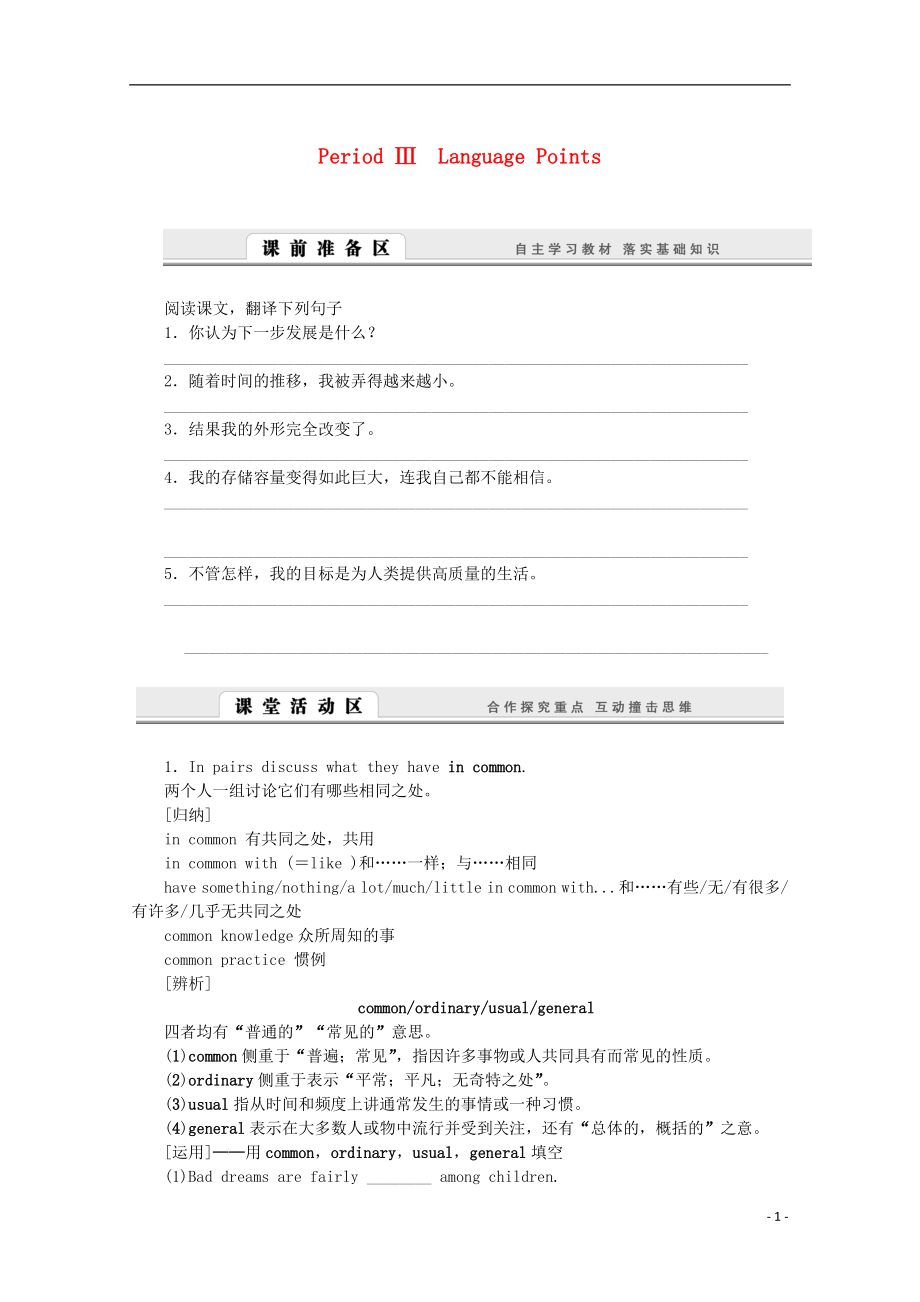《2016-2017學(xué)年高中英語(yǔ) Unit 3 Computers Period Ⅲ Language Points學(xué)案 新人教版必修2》由會(huì)員分享����,可在線閱讀�,更多相關(guān)《2016-2017學(xué)年高中英語(yǔ) Unit 3 Computers Period Ⅲ Language Points學(xué)案 新人教版必修2(4頁(yè)珍藏版)》請(qǐng)?jiān)谘b配圖網(wǎng)上搜索���。
1��、
Period Ⅲ Language Points
閱讀課文�,翻譯下列句子
1.你認(rèn)為下一步發(fā)展是什么����?
________________________________________________________________________
2.隨著時(shí)間的推移,我被弄得越來(lái)越小���。
________________________________________________________________________
3.結(jié)果我的外形完全改變了。
________________________________________________________
2�����、________________
4.我的存儲(chǔ)容量變得如此巨大��,連我自己都不能相信���。
________________________________________________________________________
________________________________________________________________________
5.不管怎樣��,我的目標(biāo)是為人類(lèi)提供高質(zhì)量的生活����。
________________________________________________________________________
___
3、_____________________________________________________________________
1.In pairs discuss what they have in common.
兩個(gè)人一組討論它們有哪些相同之處����。
[歸納]
in common 有共同之處,共用
in common with (=like )和……一樣�����;與……相同
have something/nothing/a lot/much/little in common with...和……有些/無(wú)/有很多/有許多/幾乎無(wú)共同之處
common knowledge眾所周
4��、知的事
common practice 慣例
[辨析]
common/ordinary/usual/general
四者均有“普通的”“常見(jiàn)的”意思�。
(1)common側(cè)重于“普遍;常見(jiàn)”���,指因許多事物或人共同具有而常見(jiàn)的性質(zhì)�����。
(2)ordinary側(cè)重于表示“平常��;平凡��;無(wú)奇特之處”����。
(3)usual指從時(shí)間和頻度上講通常發(fā)生的事情或一種習(xí)慣。
(4)general表示在大多數(shù)人或物中流行并受到關(guān)注����,還有“總體的,概括的”之意���。
[運(yùn)用]——用common����,ordinary��,usual�����,general填空
(1)Bad dreams are fairly _____
5��、___ among children.
(2)I’ve got a _________ idea of how I want the new room to look.
(3)The new taxes came as a shock to ________ Americans.
(4)I’ll meet you at the ________ time.
2.Work out a list and compare it with your partner.
列出一份清單����,并且把它和你同伴的作比較。
[歸納]
compare A with B 把A與B相比較
compare A
6�����、 to B 把A比作 B
compare with/to sb./sth.與某人/某事相比
compared to/with...(在尺寸�、質(zhì)量、數(shù)量上)與……相比
[運(yùn)用]
(1)There is nothing to ____________ a nice cold drink when you get home after work.
下班回家后��,沒(méi)有什么能比喝上一杯可口的冷飲更愜意的了�����。
(2)You can’t ________ the war in Somalia ________ the Vietnam War.
你不能將索馬里戰(zhàn)爭(zhēng)比作越南戰(zhàn)爭(zhēng)���。
(3)_____
7�、_____________________(與其他人的問(wèn)題相比)�����,my own problems seem unimportant.
3.As time went by�,I was made smaller.
隨著時(shí)間的推移,我被弄得越來(lái)越小�����。
[歸納]
go by 走過(guò),經(jīng)過(guò)����;(時(shí)間等)流逝;(機(jī)會(huì)等)輕易錯(cuò)過(guò)����;根據(jù),按照
go after 追求���;追趕
go against 反對(duì)
go ahead 進(jìn)展����;進(jìn)行
go over 檢查����,復(fù)習(xí)
go out 熄滅
go through 遭受,經(jīng)歷
go on with 繼續(xù)
[運(yùn)用]
(1)Never let a good
8���、 opportunity ________.
決不要放過(guò)一次好機(jī)會(huì)�����。
(2)I’ve decided to ________ that job in Ohio.
我已經(jīng)決定把俄亥俄州的那份工作爭(zhēng)取到手�。
(3)She __________ her counsel’s advice.
她沒(méi)有聽(tīng)從律師的建議����。
(4)________,we’re all listening.
開(kāi)始吧��,我們都在聽(tīng)著�。
4.But I was always so lonely standing there by myself,until in the early 1960s they gave me a
9�、 family connected by a network.
但是我總是孤孤單單地站在那里,直到二十世紀(jì)六十年代初���,人們才給了我一個(gè)用網(wǎng)絡(luò)聯(lián)成的家庭���。
[歸納]
by oneself 表示“單獨(dú)地,獨(dú)自地����,獨(dú)立地”,相當(dāng)于alone�;all by oneself 表示強(qiáng)調(diào)
be oneself處于正常狀態(tài)(指精神或身體)
to oneself獨(dú)自享用的;不與別人共享的
for oneself為自己����;替自己���,親自
of oneself自動(dòng)地(常用在不及物動(dòng)詞后)
in oneself本身;本性
[運(yùn)用]
(1)Dave spent Christmas ___________
10���、_____.
戴夫獨(dú)自一人過(guò)圣誕節(jié)�。
(2)We can complete the task ______________.
我們能夠獨(dú)立完成這項(xiàng)任務(wù)���。
(3)I’ll forgive you�;I know you ____________ when you said that.
我會(huì)原諒你����,我知道你說(shuō)那話時(shí)不能控制自己。
(4)I always dreamt of having a room ____________.
我一直夢(mèng)想著有一個(gè)完全屬于我自己的房間�����。
5.The company has given its computers away to a local scho
11�、ol.
這家公司向當(dāng)?shù)氐囊凰鶎W(xué)校捐贈(zèng)了電腦。
[歸納]
give...away捐贈(zèng)��,贈(zèng)送�����;分發(fā)����;泄露秘密
give in 呈交,交上����;投降,屈服�����,讓步
give out 分發(fā)�����;發(fā)出(氣味�、熱等);發(fā)表��,公布�����;用完,耗盡�,精疲力竭
give up 放棄,不再做……���;把……獻(xiàn)給��,使埋頭于(to)
[運(yùn)用]
(1)I need to ____________ some of these old baby clothes.
我需要把這些舊的嬰兒衣服送出去一些����。
(2)They argued back and forth until finally Buzz ________.
12����、他們反復(fù)爭(zhēng)論,直到最后布茲讓步為止���。
(3)You had no right to ______________________.
你無(wú)權(quán)公布我的電話號(hào)碼�。
(4)I’ve ________ expecting him to change.
我已經(jīng)不指望他會(huì)改變����。
Period Ⅲ Language Points
課前準(zhǔn)備區(qū)
1.What do you think will be the next development?
2.As time went by,I was made smaller.
3.As a result I totally changed my shap
13��、e.
4. My memory became so large that even I couldn’t believe it.
5. Anyhow��,my goal is to provide humans with a life of high quality.
課堂活動(dòng)區(qū)
1.(1)common (2)general (3)ordinary (4)usual
2.(1)compare with (2)compare;to
(3)Compared with other people’s
3.(1)go by (2)go after (3)went against
(4)Go ahead
4.(1)all by himself (2)by ourselves
(3)weren’t yourself (4)all to myself
5.(1)give away (2)gave in
(3)give my telephone number out
(4)given up
- 4 -
 2016-2017學(xué)年高中英語(yǔ) Unit 3 Computers Period Ⅲ Language Points學(xué)案 新人教版必修2
2016-2017學(xué)年高中英語(yǔ) Unit 3 Computers Period Ⅲ Language Points學(xué)案 新人教版必修2

